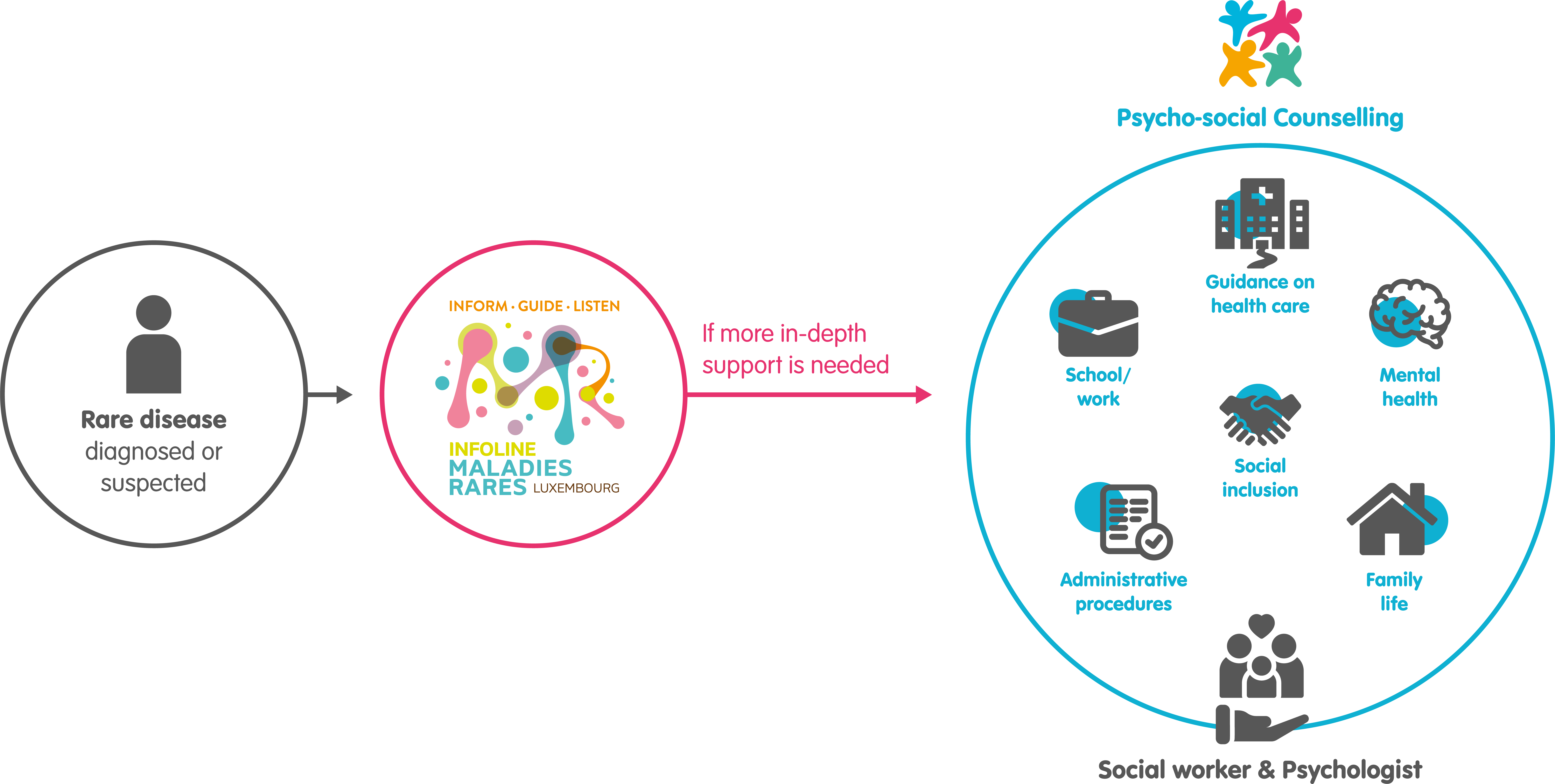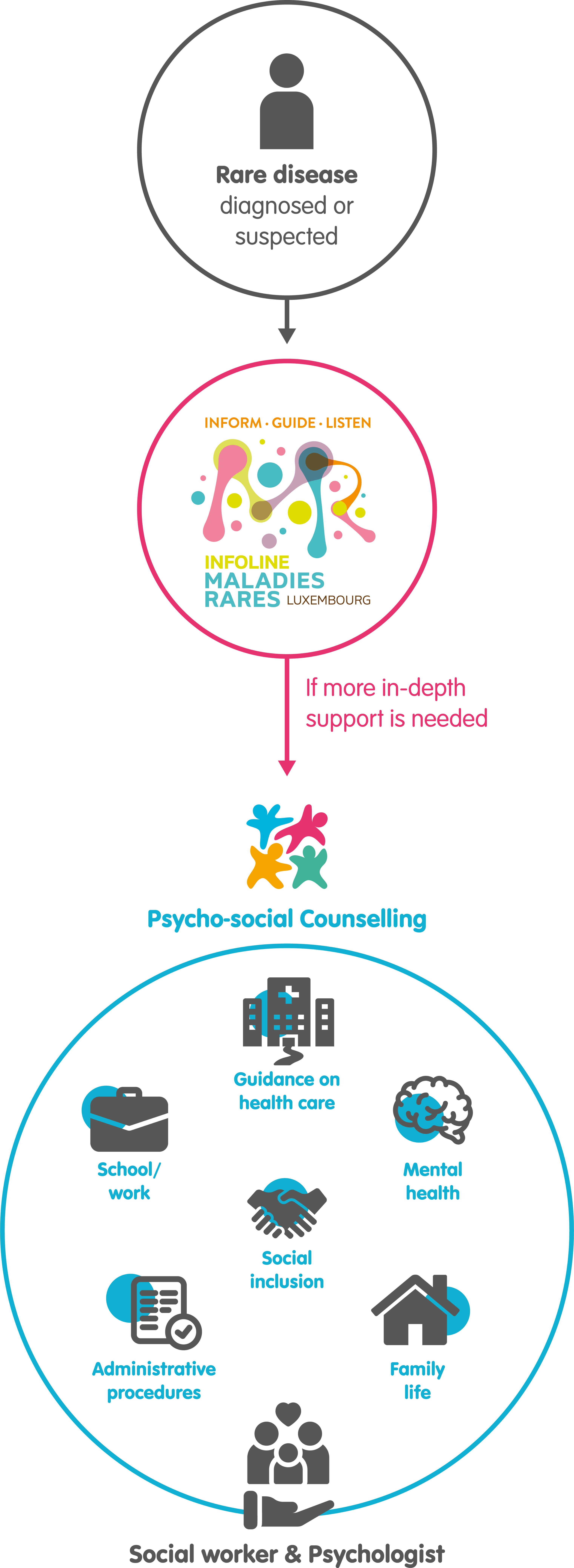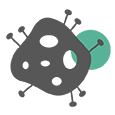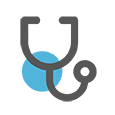
Consultations and support
Do you live
with a rare disease?
Is one of your relatives
affected by a rare disease?
Are you a healthcare professional taking care of a rare disease patient?
ALAN offers information, as well as administrative, social and psychological support to help people living with a rare disease tackle the challenges caused by the disease. ALAN’s consultation services are free of charge and specifically tailored to the individual’s needs. Any person directly or indirectly affected by a rare disease can benefit from these consultations.
ALAN’s consultation service is organised into 2 lines of support: the Infoline Maladies Rares Luxembourg and the Psycho-social Counselling Service.
When a rare disease has been diagnosed or is suspected, that person, their family member, or a healthcare professional contacts the Infoline to quickly receive information and guidance. If there is a need for more in-depth support, ALAN’s social workers and psychologists jointly support the individual and/or the family in aspects such as guidance on access to healthcare, the professional or educational path, family life, social inclusion, administrative procedures and mental health.


Infoline Maladies Rares Luxembourg
By contacting the Infoline Maladies Rares Luxembourg you can:
- receive information about the disease, the social rights, the available resources and the procedures to follow;
- be referred to the appropriate services within the country;
- talk to professionals with experience in the field of rare diseases.
The Infoline Maladies Rares Luxembourg is a first-line service managed by ALAN – Maladies Rares Luxembourg, as mandated by the Directorate of Health. This is an initiative of the first National Plan for Rare Diseases 2018-2022 launched by the Ministry of Health.
The Infoline is organised into a dedicated phone (+352 2021-2022) and e-mail address (infolineMR{A}alan.lu). A reply is guaranteed within 5 working days.
In addition, we invite you to take a look at the Luxembourg Rare Disease Guide (“Guide d’orientation luxembourgeois pour les personnes vivant avec une maladie rare”), which provides information on the services and aids that are available in Luxembourg within different areas (e.g. health care, social security, financial aid, schooling etc) and guides people through the different procedures.
In collaboration with:

Psycho-social Counselling
A team of case managers (“référents de parcours de santé“) is in charge of ALAN’s psycho-social counselling service. The case mangers hold a university degree in a paramedical or social field of study, supplemented by numerous continuing education courses related to rare diseases. They support the patients and their families all along the different development stages of their disease. Currently, the consultation team is composed of psychologists and social workers. These two professions bring their specific expertise and points of view to jointly support the patients in their life plans. By combining social and psychological expertise, ALAN is able to provide more efficient and targeted support with the ultimate goal of giving patients more autonomy and improving their quality of life.
Psychological support
Psychological counselling is offered to the patients, as well as their loved ones. They often experience anger, anxiety or stress related to the delay in diagnosis, the diagnosis itself, the prognosis, the progressive loss of autonomy, the social isolation or financial burden. Some individuals are at risk for developing depression or other mental health issues. Together with the multidisciplinary team and the psycho-social network, ALAN’s psychologists offer professional psychological counselling that is tailored to each individual’s needs. The psychologists help and empower patients to adapt, (re)construct and redirect their life plans following the diagnosis.
Administrative support & coordination
The social workers’ expertise lies primarily with managing socio-administrative procedures, providing information and coordinating interventions between different institutions. They inform patients about their disease, their rights, specialised doctors, available aid, relevant networks and reference centres. They take charge of the coordination between the patient and the medical, social, professional and school environments, so that everyone within the patient’s environment works hand in hand. The role as coordinator and information provider is often shared by ALAN’s social workers and psychologists.
Our consultation service in numbers
In 2022 ALAN’s consultation team supported 698 patients and families. This represents about 300 different diseases, most commonly neurological, neuromuscular, and systemic/autoimmune diseases. Almost half of these patients asked for help with administrative procedures. Other common enquiries include psychological counselling, guidance regarding healthcare or referrals to specialists. For more detailed statistics, please have a look at our Annual Reports.







